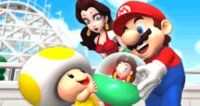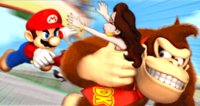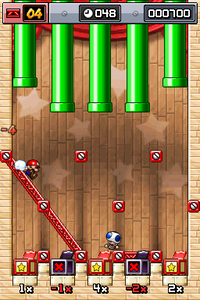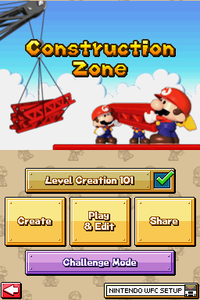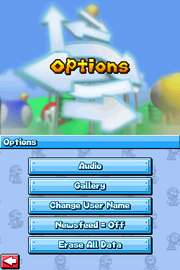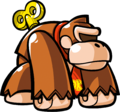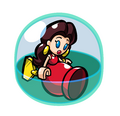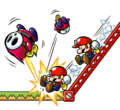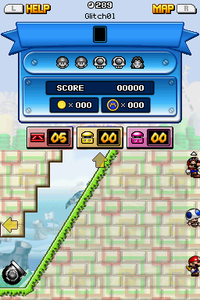Mario vs. Donkey Kong: Mini-Land Mayhem!: Difference between revisions
mNo edit summary |
m (Text replacement - "(\| *)Jap([RMCN\d]* *=)" to "$1Jpn$2") |
||
| (342 intermediate revisions by 77 users not shown) | |||
| Line 1: | Line 1: | ||
{{FA}} | |||
{{italic title}} | {{italic title}} | ||
{{ | {{game infobox | ||
|image=[[File:MvsDKMLM.jpg|250px]] | |image=[[File:MvsDKMLM.jpg|250px]] | ||
|developer=[[Nintendo Software Technology Corporation]]<br>[[Nintendo SPD Group No.3]] | |developer=[[Nintendo Software Technology Corporation]]<br>[[Nintendo SPD|Nintendo SPD Group No.3]] | ||
|publisher=[[Nintendo]] | |publisher=[[Nintendo]] | ||
| | |release={{flag list|USA|November 14, 2010|Japan|December 2, 2010|ROC|December 2, 2010|Australia|February 3, 2011|Europe|February 4, 2011|South Africa|February 11, 2011<ref>https://www.nintendo.com/en-za/Games/Nintendo-DS/Mario-vs-Donkey-Kong-Mini-Land-Mayhem--271573.html</ref>}} | ||
|genre=Puzzle | |languages={{languages|en_us=y|en_gb=y|es_es=y|es_latam=y|fr_fr=y|fr_ca=y|de=y|it=y|jp=y}} | ||
|modes=Single | |genre=[[Genre#Puzzle|Puzzle]] | ||
|ratings={{ratings|esrb=E|pegi= | |modes=Single-player | ||
|ratings={{ratings|esrb=E|pegi=3|cero=A|acb=G|usk=0}} | |||
|platforms=[[Nintendo DS]] | |platforms=[[Nintendo DS]] | ||
| | |format={{format|ds=1}} | ||
|input={{input| | |input={{input|ds=1|stylus=1}} | ||
|serials={{flag list|USA|TWL-V2GE-USA|Japan|TWL-V2GJ-JPN|Europe|TWL-V2GV-EUR (Europe/Australia)}} | |||
}} | }} | ||
'''''Mario vs. Donkey Kong: Mini-Land Mayhem!''''' is | '''''Mario vs. Donkey Kong: Mini-Land Mayhem!''''' is an action [[Genre#Puzzle|puzzle]] game for the [[Nintendo DS]]. It is the fourth game in the ''[[Mario vs. Donkey Kong (series)|Mario vs. Donkey Kong]]'' series and a follow-up to ''[[Mario vs. Donkey Kong: Minis March Again!]]'' Notably, it is also the final ''[[Super Mario (franchise)|Super Mario]]'' game released for the console, being released in North America on November 14, 2010, Japan and Taiwan on December 2, 2010, Australia on February 3, 2011, and Europe on February 4, 2011. The base gameplay and objectives of this game are mostly the same as in the previous titles, being centered on bringing all the [[Mini]] toys safely to the goal in each level. However, the gameplay is now focused on tracing paths and bridges for the Minis to use, more so than simply toggling blocks and buttons to determine their path as in the previous games. [[Mini Pauline]] toys make their debut with this game, joining the cast of Minis as the highlight of Mario's new theme park despite appearing late in the game as playable characters. Alongside the main game, a level editor is also present in a mode called the [[Construction Zone]], where players can design their own levels. | ||
A significant feature of ''Mario vs. Donkey Kong: Mini-Land Mayhem!'' was its [[Nintendo Wi-Fi Connection|Wi-Fi]] compatibility, using the same system as in ''[[Mario vs. Donkey Kong 2: March of the Minis]]''. Every two weeks, Nintendo held challenge contests where the player could submit a level that was subsequently judged by other players, with the top-rated level being announced as a winner candidate at the end of a contest. If played on a [[Nintendo DSi]] or [[Nintendo 3DS]], the game supported WPA2 and WPA Wi-Fi networks but is region-locked when played on those consoles. However, the service was terminated on May 20, 2014, rendering the game no longer playable online. | |||
Most future titles in the series, such as ''[[Mario and Donkey Kong: Minis on the Move]]'', would also feature the construction-based gimmick from ''Mario vs. Donkey Kong: Mini-Land Mayhem!'' A follow-up, ''[[Mario vs. Donkey Kong: Tipping Stars]]'', was released for the Nintendo 3DS and [[Wii U]] in March 2015. | |||
==Story== | ==Story== | ||
[[Mario]] is opening his [[Super Mini Mario World|new theme park]] with his honored guest [[Pauline]], and as an opening gift he is giving [[Mini Pauline]] toys to the first 100 guests to arrive at the park. [[Donkey Kong]] desperately wants a Mini Pauline and charges through the line of [[Toad (species)|Toads]] to get to the front, only to find out that he is the 101st guest to arrive, with Mario informing him they are all out of stock. Donkey Kong loses his temper and kidnaps the real Pauline in a fit of rage, leaving Mario and his force of [[Mini Mario (toy)|Mini Mario]]s to rescue her. | |||
[[Mario]] is opening his [[Super Mini Mario World | |||
After venturing through many attractions, the Minis reach the [[Final Ferris Wheel]] and defeat Donkey Kong. Pauline is then freed and Mario runs to hug her. However, Donkey Kong jumps and kidnaps her again, which allows the player to play the Plus Mode. In the second ending, when Donkey Kong is about to kidnap Pauline | After venturing through many attractions, the Minis reach the [[Final Ferris Wheel]] and defeat Donkey Kong. Pauline is then freed and Mario runs to hug her. However, Donkey Kong jumps and kidnaps her again, which allows the player to play the Plus Mode. In the second ending, when Donkey Kong is about to kidnap Pauline a third time, Mario offers him a Mini Pauline. Donkey Kong happily accepts it and gets into the Ferris wheel along with Mario, Pauline, and some other Minis. Several Toads can be seen celebrating the end of the conflict between Mario and Donkey Kong. | ||
<gallery widths="200"> | |||
PAULINE 6.png|Mario handing out [[Mini]]s | |||
MvsDKplot1.png|Donkey Kong charging through the line of Toads | |||
Pauline and DK.png|Donkey Kong kidnapping Pauline | |||
</gallery> | |||
==Gameplay== | ==Gameplay== | ||
===Main Game=== | |||
[[File:MvsDKMLM gameplay.png|frame|The player can move and trace various objects with the touchscreen in order to create a way for the Minis, as exemplified with a [[Purple Conveyor]] in this picture. While placing certain objects, every element stops in place, including the timer, and the background becomes gray-scale.]] | |||
The game inherits the basic gameplay of its two closest predecessors, ''Mario vs. Donkey Kong 2: March of the Minis'' and ''[[Mario vs. Donkey Kong: Minis March Again!]]'', in which the player has to complete levels by guiding a number of automated [[Mini]] toys to the [[Goal Door (Mario vs. Donkey Kong series)|exit door]], under a time limit of 300 seconds (five minutes). The Minis move by themselves and rely completely on the player dragging and moving objects such as girders, springs, conveyor belts, pipes, and ladders to modify their path using the touchscreen. In most levels, Minis can be initiated by tapping on them individually, and their course can be set both before or after initiation. Minis are also set marching if other toys bump into them. If a Mini touches an enemy, falls onto [[Spike Trap|spike]]s, touches any damaging obstacle, or falls from a height of ten or more blocks, it breaks and causes a [[Game Over]], forcing the player to restart or exit the level. | |||
Most levels end in a single exit door that all Minis share. Once the door is entered by a Mini, a timer is activated on it. If the door is not entered in time by another Mini, it will lock itself, leaving any other toys out and resulting in a Game Over. As such, the toys have to head for the exit in close succession. Other levels, designated as Multi-Door, contain multiple doors that are only used by Minis shown on them and which do not activate a timer upon being entered. In these levels, most Minis are trapped in capsules which can only be broken by a free Mini. Also, some exit doors are locked and require the Mini with a key to unlock it (in levels designated as Key). | |||
Some areas contain enemies or [[Crumble Block]]s that may prevent access to points of interest, such as doors or collectibles. To remove these obstacles, the Minis can use [[Hammer]]s picked up along the way or shoot from a [[cannon]]. Many levels feature sloped ground of varying angles; if the angle of a slope is steep enough, it will cause Minis to slide down on it uncontrollably, which can also be done to destroy obstacles but may likewise hinder the Minis from accessing certain elevated platforms unless a workaround is found. | |||
Levels are laid across eleven attractions of the [[Mini-Land]], two of which are extra attractions whose levels are unlocked under certain conditions. An [[M-Token]] is found alongside a [[Mini Mario Card]] in each level. Collecting M-Tokens is necessary to unlock levels in [[Rainbow Summit]], a bonus attraction, while Mini Mario Cards enable the player to play minigames in each attraction. | |||
The player's performance in a level is measured with a score, which takes into account the items collected along the way and the time remaining to complete the level. A goal score is established for every level, which the player can pass to earn a gold [[trophy]]. With every ten trophies that are earned, the player unlocks a new level in [[Secret Storage]], another bonus attraction besides Rainbow Summit. | |||
The final score of a level, or "Total Score," is the sum of the following: | |||
*a "Game Score," which is the score obtained by collecting [[coin]]s, [[10-Coin|large coins]], [[Mini Mario Card]]s, and [[M-Token]]s; they are worth 100, 500, 1,000, and 2,000 points, respectively; | |||
*a "Time Bonus,” 20 points are earned for each second left in the timer; | |||
*a "Collection Bonus," which is a set number of 6,000 points awarded by grabbing all collectibles in a level. | |||
Every attraction culminates with a battle against [[Donkey Kong]], where the objective is slightly changed from other levels. Instead of an exit door, Minis have to be brought into certain devices or objects that inflict damage on Donkey Kong. Meanwhile, Donkey Kong tries to impede them by changing the environment, such as making certain [[Red Girder]] rivets unusable, or by sending direct attacks. | |||
Additionally, the game features an optional [[Super Guide|Mini Guide]] that becomes available in a level after five Game Overs in a row. If the player chooses to play the guide, they can see an example of how to get the Mini Marios to the end of the stage. The music played during these guides is an arrangement of the series' invincibility theme. | |||
While in a regular level, the top screen of the console shows information related to it, such as time remaining, Mini status, and current score. By pressing the {{button|ds|R}} button, the player can switch to a schematic map of the entire level. On said map, the player can see where the Minis and enemies are located. Pressing the button again switches back to the information screen. | |||
Like in ''Mario vs. Donkey Kong 2: March of the Minis'' and ''Mario vs. Donkey Kong: Minis March Again!'', if the player enters the Nintendo DS's Sleep Mode by closing their system at any point during the game, Mario says one of four lines. However, the lines Mario says in this game are different from previous games: | |||
*"What are you doing?" | |||
*"Hey! You! Come back here!" | |||
*"Ow! My head!" | |||
*"Oh, you mamma mia (Italian gibberish)" | |||
Mario says different lines if the player exits Sleep Mode by opening their system: | |||
*"Woo-hoo!" | |||
*"Okey-dokey!" | |||
*"Let's get going!" | |||
*"Here we go!" | |||
====Minigame==== | |||
[[File:MvDKMLM Minigame 1.png|thumb|left|The first minigame level, found in Coaster Hills]] | |||
There is an optional level in every attraction that consists of a minigame. It is unlocked after all nine Mini Mario Cards are collected in that attraction. With regard to gameplay, these minigames are similar to {{wp|pachinko}} machines. The player must use objects such as Red Girders and conveyor belts to lead Minis from the top into [[Toy box (object)|toy boxes]] located at the bottom. The player scores points for each Mini that reaches its goal. There is also a time limit of 60 seconds (one minute); however, the remaining time can be increased by ten seconds by leading the Minis into clock items that occasionally spawn on the screen. The layout of each minigame varies from one attraction to another. | |||
In odd-numbered minigames, there are star-stamped toy boxes called score boxes, which offer different point values that change regularly between them. They can multiply the number of points by 1, 2, 3, or 4, with 100 being the default amount of points. However, there are also distinct, black-colored Minus Boxes that feature a red cross sign. If entered, they decrease the score with up to two times their value. In even-numbered minigames, each Mini has to be guided into a specific box that depicts its face, obtaining 100 points. Dropping a Mini in the wrong box yields no points. | |||
There are three goal scores established for every minigame. Passing one of them awards the player with an M-Token, making it possible to earn up to three M-Tokens in each minigame. | |||
====Help Mode==== | |||
[[File:CannonHelpMode.PNG|thumb|300px|Help Mode describing the use of [[Cannon]]s]] | |||
While in a level, the player can press the {{button|ds|L}} button on the console to enter Help Mode. During this mode, the game is paused and the player can tap any interactive object on-screen to learn how it functions with visual tips. | |||
{{br|left}} | |||
===Construction Zone=== | |||
[[File:MvDKMLM Construction Zone menu.png|thumb|The Construction Zone main menu]] | |||
{{main|Construction Zone#Mario vs. Donkey Kong: Mini-Land Mayhem!}} | |||
Like previous entries in the ''Mario vs. Donkey Kong'' series, ''Mario vs. Donkey Kong: Mini-Land Mayhem!'' features a '''Construction Zone''' mode, where the player can build their own custom levels and share them with other players. Before the player can access the primary features of the Construction Zone, they must create a user name and complete '''Level Creation 101''', a tutorial mode where the player must use the level editor to complete four nearly finished levels. After completing Level Creation 101, four other modes can be accessed from the Construction Zone menu: | |||
* '''Create''': Allows the player to create a level using the level editor, after choosing a Game-Rule and Template Type. | |||
*'''Play & Edit''': Allows the player to view and play their own levels, as well as levels downloaded from other players. | |||
*'''Share''': Allows the player to locally share their levels with other players. Prior to the discontinuation of [[Nintendo Wi-Fi Connection]], players could also upload and download levels online. | |||
*'''Challenge Mode''': Players could create and play levels as part of level creation contests, which Nintendo hosted every two weeks. | |||
{{br}} | |||
===Options=== | |||
[[File:MvDKMLM Options.png|thumb|180px|The Options menu]] | |||
Separate from the Main Game and Construction Zone, on the title screen, there is also an Options menu. Although it mainly serves in adjusting various settings, it also features a collection of unlockables. In the Options menu, the player can perform the following actions: | |||
*Access the Audio menu, where the volume of the music and sound effects can be adjusted. In addition, there is a Sound Test that is divided into 137 musical tunes and 235 different sound effects from the game. The Sound Test is initially locked, and only becomes available after defeating the [[Donkey Kong Final Battle|final boss]]. | |||
*Access the Gallery menu, where the player can rewatch the game's cinematic sequences, attraction intros, DK intros, and game credits, provided they were triggered beforehand during the main game. | |||
*Change their user name. | |||
*Toggle the Newsfeed feature to allow or prevent Nintendo from delivering information on the current running contest in the Construction Zone (see [[Mario vs. Donkey Kong: Mini-Land Mayhem!#Challenge Mode|Challenge Mode]]). | |||
*Erase all data from the game card. | |||
===Controls=== | |||
*{{button|ds|Stylus}} – drag or tap objects; navigate menus | |||
*{{button|ds|Pad}} – navigate level | |||
*{{button|ds|Start}} - pause game | |||
*{{button|ds|L}} - enter Help Mode (in-level) | |||
*{{button|ds|R}} - switch between map and info on the top screen (in-level) | |||
==Characters== | ==Characters== | ||
[[Mario]], one of the titular characters, only plays a role in the story cutscenes. In cutscenes that play between attractions, he is seen chasing Donkey Kong and Pauline in a locomotive, the Super Mini Mario Express, where he is accompanied by a few [[Mini]]s. After dropping at a station, Mario demonstrates the elements of the new attraction with the Minis. Meanwhile, Pauline cries for help in Donkey Kong's arms. Aside from cutscenes, [[Donkey Kong]] also appears in boss levels, where he is fought. [[Pauline]] is always kept beside him, where she watches the actions of the Minis as they unravel. [[Toad (species)|Toads]] appear as visitors of Mario's newly opened theme park, but they are only figurant characters. | |||
Only the Minis are directly used in gameplay, the help of which Mario uses to rescue Pauline. Although they are miniature versions of various characters from the ''[[Super Mario (franchise)|Super Mario]]'' franchise, Minis do not act differently from each other. Being automated clockwork toys, they simply walk from side to side and are likewise able to jump over blocks to continue their march. However, they turn around when encountering a wall of two or more blocks, a tight entrance, or a [[Conveyor Belt|conveyor belt]] going in the opposite direction. They are destroyed on contact with obstacles such as [[Spike Trap|Spike]]s, [[Shy Guy]]s, [[Pokey]]s, and [[Thwomp]]s, but can fight back with a pair of [[Hammer]]s or by [[Slide|sliding]] down a steep slope. | |||
<gallery> | |||
MiniMario MvsDK4.png|[[Mini Mario (toy)|Mini Mario]] | |||
MiniPeachtoy.png|[[Mini Peach]] | |||
Mario vs Donkey Kong MLM-Blue Toad Art.png|[[Mini Toad]] | |||
MiniDKtoy.png|[[Mini Donkey Kong]] | |||
MiniPauline.png|[[Mini Pauline]] | |||
</gallery> | |||
==Attractions== | ==Attractions== | ||
There are a total of 103 levels in the game, counting both main levels and extra levels, spread across eleven attractions. As in previous games of the series, they can be selected from a menu. Each one of these attractions, except for [[Rainbow Summit]] and [[Secret Storage]], acquaint the player with a new gameplay mechanic that is the focus of that attraction. The levels in all main attractions are built in a certain respect: a new mechanic is always introduced in the first level (and, sometimes, the second level), multiple doors appear in the fourth level, an enemy or more appear in the fifth level (though they are not exclusive to it), a type of [[Donkey Kong's robot]] is present in the seventh level, a locked exit and a Mini Mario with a key are allocated to the eighth level, and the area closes with a boss battle. | |||
==Items and | Levels in the main game are unlocked one after the other in a classic manner, but levels in Rainbow Summit are unlocked with every ten [[M-Token]]s collected in previous levels, while levels in Secret Storage require ten [[trophy|trophies]] each. Secret Storage is to be noted for puzzles that are more complex to solve than those of earlier levels, serving as an ultimate challenge for the player. | ||
{|width=100% class=wikitable | |||
|width=25% align="center"style="background:#70C0F8"|[[File:MvsDK1-2.png]] | |||
|Attraction 1<br>'''[[Coaster Hills]]'''<br>An attraction whose levels are simple puzzles meant to initiate the player in the use of Red Girders, Pipes, and Ladders. A Shy Guy and a Circus Kong are present in this attraction as well.<br>'''Areas'''<br>[[Area 1-1|1-1]] • [[Area 1-2|1-2]] • [[Area 1-3|1-3]] • [[Area 1-4|1-4]] • [[Area 1-5|1-5]] • [[Area 1-6|1-6]] • [[Area 1-7|1-7]] • [[Area 1-8|1-8]] • [[Area 1-DK|1-DK]] | |||
|- | |||
|width=25% align="center"style="background:#B0F050"|[[File:MvsDK2-2.png]] | |||
|Attraction 2<br>'''[[Jumpy Jungle (Mario vs. Donkey Kong: Mini-Land Mayhem!)|Jumpy Jungle]]'''<br>An attraction where Vertical and Horizontal Springs are added to the gameplay.<br>'''Areas'''<br>[[Area 2-1|2-1]] • [[Area 2-2|2-2]] • [[Area 2-3|2-3]] • [[Area 2-4|2-4]] • [[Area 2-5|2-5]] • [[Area 2-6|2-6]] • [[Area 2-7|2-7]] • [[Area 2-8|2-8]] • [[Area 2-DK|2-DK]] | |||
|- | |||
|width=25% align="center"style="background:#D898E0"|[[File:MvsDK3-3.png]] | |||
|Attraction 3<br>'''[[Teatime Twirl]]'''<br>An attraction that highlights conveyors. It contains both Gray Conveyors and Purple Conveyors. <br>'''Areas'''<br>[[Area 3-1|3-1]] • [[Area 3-2|3-2]] • [[Area 3-3|3-3]] • [[Area 3-4|3-4]] • [[Area 3-5|3-5]] • [[Area 3-6|3-6]] • [[Area 3-7|3-7]] • [[Area 3-8|3-8]] • [[Area 3-DK|3-DK]] | |||
|- | |||
|width=25% align="center"style="background:#7090D8"|[[File:MvsDK4-5.png]] | |||
|Attraction 4<br>'''[[Warped Mansion]]'''<br>An attraction that introduces movable Green Pipes, as well as Piranha Plants and Piranhas with Fire as enemies.<br>'''Areas'''<br>[[Area 4-1|4-1]] • [[Area 4-2|4-2]] • [[Area 4-3|4-3]] • [[Area 4-4|4-4]] • [[Area 4-5|4-5]] • [[Area 4-6|4-6]] • [[Area 4-7|4-7]] • [[Area 4-8|4-8]] • [[Area 4-DK|4-DK]] | |||
|- | |||
|width=25% align="center"style="background:#F8A870"|[[File:MvsDK5-2.png]] | |||
|Attraction 5<br>'''[[Sandstorm Steps]]'''<br>An attraction where Blue Ladders are introduced to the gameplay, alongside Fireball enemies, as an homage to the original ''Donkey Kong'' game. The Capture Kong also makes its first appearance in the game.<br>'''Areas'''<br>[[Area 5-1|5-1]] • [[Area 5-2|5-2]] • [[Area 5-3|5-3]] • [[Area 5-4|5-4]] • [[Area 5-5|5-5]] • [[Area 5-6|5-6]] • [[Area 5-7|5-7]] • [[Area 5-8|5-8]] • [[Area 5-DK|5-DK]] | |||
|- | |||
|width=25% align="center"style="background:#98A0C0"|[[File:MvsDK6-2.png]] | |||
|Attraction 6<br>'''[[Cosmic Adventure]]'''<br>An attraction where the gameplay revolves around the use of the newly-introduced Magnet Rods and Blockers. Thwomps are encountered in this attraction for the first time.<br>'''Areas'''<br>[[Area 6-1|6-1]] • [[Area 6-2|6-2]] • [[Area 6-3|6-3]] • [[Area 6-4|6-4]] • [[Area 6-5|6-5]] • [[Area 6-6|6-6]] • [[Area 6-7|6-7]] • [[Area 6-8|6-8]] • [[Area 6-DK|6-DK]] | |||
|- | |||
|width=25% align="center"style="background:#48C090"|[[File:MvsDK7-6.png]] | |||
|Attraction 7<br>'''[[Cannon Cove]]'''<br>An attraction whose primary gimmick are Cannons that shoot the Minis in various directions. A few Snifits also reside in this attraction.<br>'''Areas'''<br>[[Area 7-1|7-1]] • [[Area 7-2|7-2]] • [[Area 7-3|7-3]] • [[Area 7-4|7-4]] • [[Area 7-5|7-5]] • [[Area 7-6|7-6]] • [[Area 7-7|7-7]] • [[Area 7-8|7-8]] • [[Area 7-DK|7-DK]] | |||
|- | |||
|width=25% align="center"style="background:#F8A0E8"|[[File:MvsDK8-1.png]] | |||
|Attraction 8<br>'''[[Super Skywheel]]'''<br>An attraction that introduces enemy blocks that can be filled in by certain enemies, such as Shy Guys and Pokeys, the latter being seen within this attraction for the first time in the game. The attraction also recapitulates the mechanics used in previous levels.<br>'''Areas'''<br>[[Area 8-1|8-1]] • [[Area 8-2|8-2]] • [[Area 8-3|8-3]] • [[Area 8-4|8-4]] • [[Area 8-5|8-5]] • [[Area 8-6|8-6]] • [[Area 8-7|8-7]] • [[Area 8-8|8-8]] • [[Area 8-DK|8-DK]] | |||
|- | |||
|width=25% align="center"style="background:#8048F8"|[[File:MvsDKFinalBattle.png]] | |||
|Final Battle<br>'''[[Final Ferris Wheel]]'''<br>An attraction that hosts the final boss battle with Donkey Kong. It is also the last main attraction of the game.<br>'''Area'''<br>[[Donkey Kong Final Battle]] | |||
|- | |||
|width=25% align="center"style="background:#E16F91"|[[File:MvsDKS-3.png]] | |||
|Special Levels<br>'''[[Rainbow Summit]]'''<br>An extra attraction with a series of challenges referred to as "Special Levels," during which the player is only allowed to change the environment after activating all the Minis at the same time by tapping the "Start" button. The attraction does not introduce new elements, but reuses all of the previous ones. It is the largest attraction in the game, spreading on two level select menus.<br>'''Areas'''<br>[[Area S-1|S-1]] • [[Area S-2|S-2]] • [[Area S-3|S-3]] • [[Area S-4|S-4]] • [[Area S-5|S-5]] • [[Area S-6|S-6]] • [[Area S-7|S-7]] • [[Area S-8|S-8]] • [[Area S-9|S-9]] • [[Area S-10|S-10]]<br>[[Area S-11|S-11]] • [[Area S-12|S-12]] • [[Area S-13|S-13]] • [[Area S-14|S-14]] • [[Area S-15|S-15]] • [[Area S-16|S-16]] • [[Area S-17|S-17]] • [[Area S-18|S-18]] • [[Area S-19|S-19]] • [[Area S-20|S-20]] | |||
|- | |||
|width=25% align="center"style="background:#B08840"|[[File:MvsDKX-6.png]] | |||
|Expert Levels<br>'''[[Secret Storage]]'''<br>Another extra attraction that resumes the main gameplay. Its levels are also referred to as the "Expert Levels," as it features previous game mechanics in puzzles that are considerably more difficult to solve.<br>'''Areas'''<br>[[Area X-1|X-1]] • [[Area X-2|X-2]] • [[Area X-3|X-3]] • [[Area X-4|X-4]] • [[Area X-5|X-5]] • [[Area X-6|X-6]] • [[Area X-7|X-7]] • [[Area X-8|X-8]] • [[Area X-9|X-9]] • [[Area X-10|X-10]] | |||
|} | |||
===Plus Mode=== | |||
After defeating him in [[Final Ferris Wheel]], Donkey Kong manages to run off with Pauline once more, prompting the player to traverse all levels again in a new mode called Plus Mode. During Plus Mode, Minis must enter the exit door in a certain order, which is indicated at the beginning of each stage and also shown on the top screen of the console. While this complicates gameplay, there are otherwise no changes in level layout, although the background in each attraction gains slightly different aesthetics. In Plus Mode, all M-Tokens and Mini Mario Cards have to be collected again. The player can switch to Plus Mode anytime by tapping on the "Plus" button on the level select menu. In Plus Mode, the name of each attraction is written with a "+" at the end, such as: | |||
*Coaster Hills+ | |||
*Jumpy Jungle+ | |||
*Teatime Twirl+ | |||
*Warped Mansion+ | |||
*Sandstorm Steps+ | |||
*Cosmic Adventure+ | |||
*Cannon Cove+ | |||
*Super Skywheel+ | |||
*Final Ferris Wheel+ | |||
*Rainbow Summit+ | |||
*Secret Storage+ | |||
Pauline is rescued and the game is beaten after defeating Donkey Kong in Final Ferris Wheel+. | |||
==Items and objects== | |||
The game presents a wide variety of objects that fulfill certain purposes. The most represented objects in the game are the resource items, which can be taken, stored, and repositioned in special designated areas. There are also numerous objects that are fixed, but are similarly used to the player's advantage. Most collectable items have a direct role in [[Completion|completing]] the game, but a few others only have a function within levels. | |||
{|width=100% class=wikitable | |||
|- | |||
!width="1"|Object | |||
!About | |||
|- | |||
|align="center"|[[File:MLM Blocker Activated.png]][[File:MLM Blocker Deactivated.png]]<br>[[Blocker]]s | |||
|align="left"|Blockers are metal blocks that act as either walls or floors that can be placed using the stylus. | |||
|- | |||
|align="center"|[[File:MLM Blue Ladder.png]]<br>[[Blue Ladder]]s | |||
|align="left"|Blue Ladders are ladders that can be drawn using the stylus and climbed by the Minis. | |||
|- | |||
|align="center"|[[File:MLM Cannon.png]]<br>[[Cannon]]s | |||
|align="left"|Cannons are objects used to shoot the Minis to a different part of a level. | |||
|- | |||
|align="center"|[[File:MLM Coin.png]][[File:MLM Big Coin.png]]<br>[[Coin]]s | |||
|align="left"|Coins can be collected throughout the levels for points. [[Five Coin|Large coin]]s also appear, which are worth 5 normal coins. | |||
|- | |||
|align="center"|[[File:MLM Conveyor.png]]<br>[[Conveyor Belt|Conveyor belt]]s | |||
|align="left"|Conveyor belts move Minis and enemies in a certain direction. | |||
|- | |||
|align="center"|[[File:MLM Conveyor Switch.png]]<br>[[Conveyor switch]]es | |||
|align="left"|Conveyor switches can reverse the direction of all conveyor belts in a level if the player taps them with the stylus. | |||
|- | |||
|align="center"|[[File:MLM Conveyor Pickup.png]]<br>[[Pickup|Conveyor Pickups]] | |||
|align="left"|Conveyor Pickups give the player more conveyor belts to place. Bigger versions appear which give the player five Conveyor Pickups. | |||
|- | |||
|align="center"|[[File:MLM Rock Block.png]]<br>[[Crumble Block]]s | |||
|align="left"|Crumble Blocks are blocks that break and fall apart under a Mini's weight. They can also be destroyed by shooting a Mini from a Cannon or by having a Thwomp fall on them. | |||
|- | |||
|align="center"|[[File:Mini Default Door.png]][[File:Mini Mario Door.png]][[File:Mini Toad Door.png]][[File:Mini Peach Door.png]][[File:Mini DK Door.png]][[File:Mini Pauline Door.png]][[File:Mini Locked Door.png]]<br>[[Goal Door (Mario vs. Donkey Kong series)|Exit Doors]] | |||
|align="left"|Exit Doors are the goals of each level; the player must lead the Minis into them. Mini-specific Exit Doors also appear, as well as locked Exit Doors. | |||
|- | |||
|align="center"|[[File:MLM Girder.png]]<br>[[Girder]]s | |||
|align="left"|Girders are platforms that are used mainly for decoration in most levels. They are semi-solid and are not affected by anything. | |||
|- | |||
|align="center"|[[File:MLM Girder Pickup.png]][[File:MLM Girder Pickup Big.png]]<br>[[Pickup|Girder Pickups]] | |||
|align="left"|Girder Pickups give the player more Red Girders to draw. Bigger versions appear which give the player 5 Girder Pickups. | |||
|- | |||
|align="center"|[[File:MLM Hammer.png]]<br>[[Hammer]]s | |||
|align="left"|Hammers can be used to stun enemies such as Circus Kongs or break Rock Blocks. | |||
|- | |||
|align="center"|[[File:MLM Horizontal Spring.png]]<br>[[Long Spring|Horizontal Spring]]s | |||
|align="left"|Horizontal Springs bounce the Minis in a wide arc. | |||
|- | |||
|align="center"|[[File:MLM Ladder.png]]<br>[[Ladder]]s | |||
|align="left"|Ladders are objects that the Minis are able to climb in order to reach higher levels. | |||
|- | |||
|align="center"|[[File:MLM Ladder Pickup.png]]<br>[[Pickup|Ladder Pickups]] | |||
|align="left"|Ladder Pickups give the player more Blue Ladder to place. Bigger versions appear which give the player 5 Ladder Pickups. | |||
|- | |||
|align="center"|[[File:MToken.png]]<br>[[M-Token]]s | |||
|align="left"|M-Tokens are collectibles found in each level that give the player 2000 points. | |||
|- | |||
|align="center"|[[File:MLM Magnet Block.png]]<br>[[Magnet Ground|Magnet Blocks]] | |||
|align="left"|Magnet Blocks allow Minis to walk sideways and upside down on them. | |||
|- | |||
|align="center"|[[File:MLM Magnet Rod.png]]<br>[[Magnet Rod]]s | |||
|align="left"|Magnet Rods are objects that flip the Minis in another path when they are walking on a magnetic surface. | |||
|- | |||
|align="center"|[[File:MLM Mini Mario Card.png]]<br>[[Mini Mario Card]]s | |||
|align="left"|Mini Mario Cards are found in each level. They spell out "MINIMARIO" and unlock a minigame when all of them are collected in a world. | |||
|- | |||
|align="center"|[[File:WarpPipeMvsDKMLM.png]][[File:MLM Green Pipe Deactivated.png]]<br>[[Movable Pipe]]s | |||
|align="left"|Movable Pipes are green Warp Pipes that can be moved and appear as dotted outlines. | |||
|- | |||
|align="center"|[[File:MLM Blue Pipe.png]]<br>[[Warp Pipe|Pipes]] | |||
|align="left"|Pipes are blue Warp Pipes that lead Minis to another area of a level. If a Mini enters one end of a pipe, it moves to the other end. | |||
|- | |||
|align="center"|[[File:MLM Purple Conveyor.png]]<br>[[Purple Conveyor]]s | |||
|align="left"|Purple Conveyors are conveyor belts that can be drawn using the stylus. | |||
|- | |||
|align="center"|[[File:MLM Red Girder.png]]<br>[[Red Girder]]s | |||
|align="left"|Red Girders are girders that can be drawn using the stylus. | |||
|- | |||
|align="center"|[[File:MLM Spike.png]]<br>[[Spike Trap|Spike]]s | |||
|align="left"|Spikes are obstacles that destroy the Minis if they are touched, causing the player to have to restart the level. | |||
|- | |||
|align="center"|[[File:MLM Split Pipe Yellow.png]][[File:MLM Split Pipe Cyan.png]][[File:MLM Split Pipe Orange.png]][[File:MLM Split Pipe Red.png]]<br>[[Warp Pipe|Split Pipe]]s | |||
|align="left"|Split Pipes are Warp Pipes that appear in pairs. If a Mini enters a Split Pipe, it moves to the other Split Pipe of the same color. Split Pipes can be yellow, cyan, orange, or red. | |||
|- | |||
|align="center"|[[File:MLM Vertical Spring.png]]<br>[[High Spring|Vertical Spring]]s | |||
|align="left"|Vertical Springs bounce the Minis straight into the air. | |||
|} | |||
==Enemies== | ==Enemies== | ||
Enemies encountered over the course of the game, not counting boss-exclusive obstacles such as barrels, are represented by two types. The first type are malevolent enemies that destroy the Minis by touching or attacking them; however, most of them can be defeated with Hammers, a [[Slope Slide|slope slide]] or a Cannon blast. The second type consists of [[Donkey Kong's robot]]s that use the Minis in characteristic ways. Their actions may be helpful or dangerous, although they never inflict damage on the Minis. These enemies are invulnerable, but can be stunned by attacking them by the same means described earlier, which is necessary in certain situations. | |||
{|width=100% class=wikitable | |||
|- | |||
!width="1"|Enemy | |||
!About | |||
!width="1"|First appearance | |||
!width="1"|Last appearance | |||
|- | |||
|align="center"|[[File:MLM Barrel.png]]<br>[[Barrel]] | |||
|align="left"|Donkey Kong uses barrels in a few of his boss fights by pounding the ground and causing them to fall. | |||
|align="center"|[[Area 1-DK]] | |||
|align="center"|[[Area 8-DK]] | |||
|- | |||
|align="center"|[[File:MLM Capture Kong.png]]<br>[[Capture Kong]] | |||
|align="left"|Capture Kongs capture [[Mini]]s inside the barrel on their back and can end a level in failure if all Minis are captured. They can be stunned with a hammer. | |||
|align="center"|[[Area 5-7]] | |||
|align="center"|[[Area 8-7]] | |||
|- | |||
|align="center"|[[File:MLM Circus Kong.png]]<br>[[Circus Kong]] | |||
|align="left"|Circus Kongs throw Minis up into the air and can be stunned using a hammer. | |||
|align="center"|[[Area 1-7]] | |||
|align="center"|[[Area X-3]] | |||
|- | |||
|align="center"|[[File:MLM Fire Piranha Plant.png]]<br>[[Fire Piranha Plant|Piranha with Fire]] | |||
|align="left"|These [[Piranha Plant]]s spit fireballs, which can destroy the Minis. | |||
|align="center"|[[Area 4-5]] | |||
|align="center"|[[Area X-9]] | |||
|- | |||
|align="center"|[[File:MLM Fireball.png]]<br>[[Fireball (Donkey Kong)|Fireball]] | |||
|align="left"|Fireballs move along the ground and will charge at a Mini if they are holding a hammer, allowing it to be defeated. | |||
|align="center"|[[Area 5-2]] | |||
|align="center"|[[Area S-10]] | |||
|- | |||
|align="center"|[[File:MLM Pokey.png]]<br>[[Pokey]] | |||
|align="left"|Pokeys move along the ground and will turn transparent yellow blocks into solid blocks called [[Pokey Block]]s. They can be defeated by shooting a Mini at one using a cannon. | |||
|align="center"|[[Area 8-3]] | |||
|align="center"|[[Area S-16]] | |||
|- | |||
|align="center"|[[Polterguy]] | |||
|align="left"|Polterguys that are summoned from a Shy Guy portrait. | |||
|colspan="2"align=center|[[Area 4-DK]] | |||
|- | |||
|align="center"|[[File:MLM Shy Guy.png]]<br>[[Shy Guy]] | |||
|align="left"|Shy Guys can be stood on by the Minis and will turn some transparent blocks into solid blocks called [[Shy Guy Block]]s. | |||
|align="center"|[[Area 1-4]] | |||
|align="center"|[[Area X-5]] | |||
|- | |||
|align="center"|[[File:MLM Snifit.png]]<br>[[Snifit]] | |||
|align="left"|Snifits attack by moving quickly along the ground and shooting five successive bullets at the Minis. | |||
|align="center"|[[Area 7-6]] | |||
|align="center"|[[Area X-9]] | |||
|- | |||
|align="center"|[[File:MLM Magnet Sparky.png]]<br>[[Magnet Sparky]] | |||
|align="left"|Magnet Sparkies move along magnetic objects and their path can be changed by flipping a Magnet Rod. | |||
|align="center"|[[Area 6-2]] | |||
|align="center"|[[Area 6-DK]] | |||
|- | |||
|align="center"|[[File:MLM Thwomp.png]]<br>[[Thwomp]] | |||
|align="left"|Thwomps attempt to destroy the Minis by falling and crushing them. They can destroy objects such as Crumble Blocks. | |||
|align="center"|[[Area 6-3]] | |||
|align="center"|[[Area X-8]] | |||
|- | |||
|align="center"|[[File:MLM Donkey Kong.png]]<br>[[Donkey Kong]] | |||
|align="left"|Donkey Kong appears as the boss of the last level in every world except for [[Rainbow Summit]] and [[Secret Storage]]. His attacks range from dropping barrels to hitting a switch which enables or disables an object. | |||
|align="center"|[[Area 1-DK]] | |||
|align="center"|[[Donkey Kong Final Battle]] | |||
|} | |||
==Reception== | |||
Critical reception of ''Mario vs. Donkey Kong: Mini-Land Mayhem!'' was positive, and the game was repeatedly stated to offer an entertaining experience delivered with an appealing presentation. It currently has a score of 79 based on 51 reviews on Metacritic, and had an 80.08% score on GameRankings. | |||
Daemon Hatfield of IGN "[could not] stress enough that [the game] is pure joy to play", stating that the variety of collectables brings a significant contribution to the game's replay value. He also described the game as "absolutely adorable," and the puzzles as "satisfying to work out" despite not being particularly difficult. However, he added that a speed-up option would have been beneficial for gameplay, as he found the movement of the Minis to be rather sluggish, especially in earlier levels.<ref>{{cite|author=Hatfield, Daemon|date=November 12, 2010|url=www.ign.com/articles/2010/11/13/mario-vs-donkey-kong-mini-land-mayhem-review|title=''Mario vs. Donkey Kong: Mini-land Mayhem'' Review|publisher=IGN|accessdate=June 22, 2024}}</ref> | |||
Philip J Reed of Nintendo Life debuted his review by describing the game as "stellar" and "an excellent place to start" for those unfamiliar with the ''Mario vs. Donkey Kong'' series. He noted that part of the fun stems from the game's spirit of discovery, which properly defines the levels from a design standpoint. He made mention of the game's level editor, describing it as simple to grasp, and further noted the ability to share and download custom levels, which he praised for greatly extending the game's replayability. The graphics were said to compose a "sweet, sunny atmosphere," and the cutscenes as well as soundtrack were also complimented.<ref>{{cite|author=Reed, Philip J|date=December 19, 2010|url=www.nintendolife.com/reviews/2010/12/mario_vs_donkey_kong_mini_land_mayhem_ds|title=Review: ''Mario vs. Donkey Kong: Mini-Land Mayhem!'' <small>(DS)</small>|publisher=Nintendo Life|accessdate=June 22, 2024}}</ref> | |||
Nathan Meunier of GameSpot referred to the game's story as "bare-bones" and "esentially the same plot" as in past games, but favored the gameplay of ''Mario vs. Donkey Kong: Mini-Land Mayhem!'' over other titles in the series. In this regard, he appreciated the game's concept of building the environment for the Minis, instead of simply toggling blocks and other features to form their way as in past games.<ref>{{cite|author=Meunier, Nathan|date=November 12, 2010|url=www.gamespot.com/reviews/mario-vs-donkey-kong-mini-land-mayhem-review/1900-6284006|title=''Mario vs. Donkey Kong: Mini-Land Mayhem'' Review|publisher=GameSpot|accessdate=June 22, 2024}}</ref> | |||
{|class="wikitable reviews" | |||
!colspan="4"style="font-size:120%;text-align:center;background-color:silver"|Reviews | |||
|-style="background-color:#E6E6E6;" | |||
|Reviewer, Publication | |||
|Score | |||
|Comment | |||
|- | |||
|Daemon Hatfield, [http://www.ign.com/articles/2010/11/13/mario-vs-donkey-kong-mini-land-mayhem-review IGN] | |||
|9.0/10 | |||
|align="left"|"''The Mario vs. Donkey Kong series never fails to deliver enjoyable puzzle experiences. Mini-Land Mayhem essentially offers "more of the same," but when that same is so charming you're not going to hear too many complaints. The ability to create your own levels, share them online, and compete in Nintendo sanctioned design contests gives Mini-Land Mayhem major replay value. This is most likely the last Mario vs. Donkey Kong game we'll get for the DS, so don't miss it.''" | |||
|- | |||
|Philip J Reed, [http://www.nintendolife.com/reviews/2010/12/mario_vs_donkey_kong_mini_land_mayhem_ds Nintendo Life] | |||
|9/10 | |||
|align="left"|"''Lots of gameplay, great graphics, a wonderful soundtrack and flawless touchscreen controls make Mario vs. Donkey Kong: Mini-Land Mayhem! a worthy addition to an often-overlooked franchise. While the game's real-time puzzle element may not appeal to everybody, those who do take the time to become familiar with it will appreciate its unique and challenging approach. Mini-Land Mayhem! proves that – four games in – the Mario vs. Donkey Kong series hasn't lost one ounce of charm.''" | |||
|- | |||
|Nathan Meunier, [https://www.gamespot.com/reviews/mario-vs-donkey-kong-mini-land-mayhem-review/1900-6284006/ GameSpot] | |||
|8/10 | |||
|align="left"|"''If you enjoyed the previous entries enough to crave more, or if you've been thinking about checking out the series for the first time, don't hesitate to give Mini-Land Mayhem a go.''" | |||
|- | |||
!colspan="4"style="background-color:silver;font-size:120%;text-align:center;"|Aggregators | |||
|-style="background-color:#E6E6E6;" | |||
|colspan=2|Compiler | |||
|colspan=2|Platform / Score | |||
|- | |||
|colspan=2|Metacritic | |||
|colspan=2 style="background-color:LimeGreen"|[http://www.metacritic.com/game/ds/mario-vs-donkey-kong-mini-land-mayhem 79] | |||
|- | |||
|colspan=2|GameRankings | |||
|colspan=2|[https://web.archive.org/web/20191209014921/http://www.gamerankings.com/ds/997857-mario-vs-donkey-kong-mini-land-mayhem/index.html 80.08%] | |||
|} | |||
==Gallery== | |||
{{main-gallery}} | |||
<gallery> | |||
MsvDKMLMart1.png|[[Donkey Kong]], [[Mario]], [[Pauline]], and [[Mini Mario (toy)|Mini Mario]]s | |||
MsvDKMLMart2.png|Mini Marios sliding down a Red Girder | |||
MvsDKMLMM.png|Promotional group artwork | |||
</gallery> | |||
==Media== | |||
{{main-media}} | |||
{{media table | |||
|file1=MvDKMLM Theme.oga | |||
|title1=Main theme | |||
|file2=MVDKMLM Pauline Calling For Help Audio.oga | |||
|title2=Pauline screaming for help | |||
}} | |||
==Pre-release and unused content== | |||
Within the game's [[Shy Guy]] assets is a leftover sprite of the spear from ''[[Mario vs. Donkey Kong: Minis March Again!]]''.<ref>{{cite|author=lexicon86|url=www.spriters-resource.com/ds_dsi/mvsdkminilandmayhem/sheet/197748|title=DS / DSi - Mario vs. Donkey Kong: Mini-Land Mayhem! - Shy Guy|publisher=The Spriters Resource|accessdate=March 14, 2024}}</ref> This may indicate that both types of Shy Guys were intended to appear. | |||
==Staff== | ==Staff== | ||
{{main|List of Mario vs. Donkey Kong: Mini-Land Mayhem! staff}} | {{main|List of Mario vs. Donkey Kong: Mini-Land Mayhem! staff}} | ||
The game was developed under the direction of Yuki Shimura by the [[Nintendo Software Technology Corporation]], which is also accounted for previous ''Mario vs. Donkey Kong'' projects. Development of the game was assisted by the [[Nintendo Software Planning & Development]] Group No. 3. Notably, the game's lead level designer, [[Stephen Mortimer]], would be promoted to direct subsequent titles in the series. For ''Mario vs. Donkey Kong: Mini-Land Mayhem!'', Mortimer designed over 50 stages, while the rest were created by two other designers under his supervision. In addition, he assisted the development of level editor features, and helped design various objects from the game as well.<ref>{{cite|url=www.linkedin.com/in/stephen-mortimer-17303a1b|title=Stephen Mortimer|language=en|publisher=LinkedIn|accessdate=June 22, 2024}}{{dead link}}</ref> The audio direction was provided by [[Lawrence Schwedler]], whose work for ''Mario vs. Donkey Kong: Mini-Land Mayhem!'' would be one of his last contributions at Nintendo before leaving the company in 2012.<ref>{{cite|url=www.linkedin.com/in/lawrenceschwedler|title=Lawrence Schwedler|publisher=LinkedIn|language=en|accessdate=June 22, 2024}}</ref> | |||
==Glitches== | |||
{{unreferenced|more=yes|section=yes|Citations for every glitch.}} | |||
===DK stage sound glitch=== | |||
In any DK stage with rivets, once Donkey Kong is hit and recovers from it, the player should hold one rivet down quickly. Donkey Kong's yell and [[Pauline]]'s call will be heard, even though their sprites are not in motion. When the rivet is let go, Donkey and Pauline's animations will resume without their voice clips. | |||
===Intangible girders=== | |||
When a [[Mini Mario (toy)|Mini Mario]] is in-between a pair of red rivets, the player needs to quickly create a girder between the two. When performed, the Mini will go through the girder as if it was not there. (This can be performed either horizontally or vertically.) | |||
===Offscreen death glitches=== | |||
[[File:MvsDK_Glitch_01.png|thumb]] | |||
When building a level in the Construction Zone, if the player creates a slope, then places a stationary cannon at the bottom (this must be done in the level borders and maximum slope), when the Minis are fired, they will pass through the wall and they will fall off the screen. | |||
{{br}} | |||
== | A similar glitch occurs in [[Area 5-DK]]. Here, the player should connect a girder from the top left to the bottom right rivet by the card. Next, they must have a [[Fireball (Donkey Kong)|Fireball]] next to the top left rivet. When done correctly, the Fireball will go down the red girder, fall through the floor at the end, and death sound clip play a second later. | ||
{{ | |||
===Spring glitch=== | |||
In Construction Zone, the player needs to create a level. They need to put a tile on the ground so the [[Mini Mario (toy)|Mini Mario]] can jump and put a spring one-and-a-half blocks above the tile. When starting the Minis, one will try to jump, but will pass through the tile. | |||
==References to other games== | |||
*''[[Donkey Kong (game)|Donkey Kong]]'': The "[[Opening (Donkey Kong)|Opening]]" theme of this game is arranged into the main theme. The introduction sequence when Donkey Kong climbs some ladders with Pauline is referenced at the end of each non-final boss battle through both music and action, as Donkey Kong similarly runs off with Pauline to another attraction. Objects such as [[Red Girder]]s and [[Blue Ladder]]s are reminiscent of stage elements from ''Donkey Kong'', as are the [[Hammer]]s which play their original jingle when in use. In fact, [[Area 5-2]], a level that contains all these elements and [[Fireball (Donkey Kong)|Fireball]] enemies, appears to be a direct homage to levels like [[25m]] and [[75m]] from ''Donkey Kong''. | |||
*''[[Super Mario Bros.]]'': The "[[Ground Theme (Super Mario Bros.)|Ground Theme]]" from this game is arranged into the main theme. The "[[Underground Theme]]" is arranged for the soundtrack of [[Secret Storage]]. | |||
*''[[Super Mario Bros. 2]]'': The "[[Ground Theme (Super Mario Bros. 2)|Ground Theme]]", the lost life theme, and the boss victory theme of this game are arranged for the soundtrack of [[Coaster Hills]]. The boss theme is likewise arranged for the battle with Donkey Kong in Coaster Hills. | |||
*''[[Donkey Kong Country]]'': "[[DK Island Swing]]" is arranged for the soundtrack of [[Jumpy Jungle (Mario vs. Donkey Kong: Mini-Land Mayhem!)|Jumpy Jungle]]. | |||
*''[[Super Mario 64]]'': "[[Inside the Castle Walls]]", the theme of [[Peach's Castle]], is arranged for the soundtrack of [[Teatime Twirl]]. | |||
*''[[New Super Mario Bros.]]'': Mario's walk cycle from this game is reused for the final cutscene, when Pauline is rescued. | |||
==Names in other languages== | |||
{{foreign names| | |||
|Jpn=マリオ{{ruby|vs.|ブイエス}}ドンキーコング 突撃!ミニランド | |||
|JpnR=Mario buiesu Donkī Kongu Totsugeki! Mini Rando | |||
|JpnM=Mario vs. Donkey Kong: Attack! Mini-Land | |||
|ChiT=瑪利歐vs.大金剛 突擊!迷你樂園<ref>{{cite|deadlink=y|archive=web.archive.org/web/20190311181255/http://www.nintendo.tw/ds/ds_software.htm|title=Nintendo DS 遊戯軟體|language=zh-hant|publisher=Nintendo of Taiwan|accessdate=June 22, 2024}}</ref> | |||
|ChiTR=Mǎlìōu vs. Dàjīn'gāng Tújí! Mínǐ Lèyuán | |||
|ChiTM=Mario vs. Donkey Kong: Assault! Mini Wonderland | |||
|SpaA=''Mario vs. Donkey Kong: Mini-Land Mayhem!'' | |||
|SpaE=''Mario vs. Donkey Kong: ¡Megalío en Minilandia!'' | |||
|SpaEM=''Mario vs. Donkey Kong: Megamess in Mini-Land!'' | |||
|Ita=''Mario vs. Donkey Kong: Parapiglia a Minilandia'' | |||
|ItaM=''Mario vs. Donkey Kong: Turmoil in Mini-Land'' | |||
|FreE=''Mario vs. Donkey Kong: Pagaille à Mini-Land !'' | |||
|FreEM=''Mario vs. Donkey Kong: Mess in Mini-Land!'' | |||
|Ger=''Mario vs. Donkey Kong: Aufruhr im Miniland!'' | |||
|GerM=''Mario vs. Donkey Kong: Turmoil in Mini-Land!'' | |||
}} | |||
== | ==References== | ||
<references/> | |||
== | ==External links== | ||
{{ | {{NIWA|NWiki=1|StrategyWiki=1}} | ||
{{TCRF|Mario vs. Donkey Kong: Mini Land Mayhem!}} | |||
*[http://mariovsdk.nintendo.com/ Official North American website]{{dead link}} | |||
*[https://www.nintendo.com/games/detail/6wqIbzCmluiHj6kL5PNU2hDcX4i4fh11 Official North American game page]{{dead link}} | |||
*[https://www.nintendo.co.jp/ds/v2gj/index.html Official Japanese website] | |||
*[http://gamesites.nintendo.com.au/mario-vs-donkey-kong-miniland-mayhem/en_AU/index.php# Official Australian website]{{dead link}} | |||
*[https://www.nintendo.com/en-gb/Games/Nintendo-DS/Mario-vs-Donkey-Kong-Mini-Land-Mayhem--271573.html Official European website] | |||
*[https://www.nintendo.com/consumer/gameslist/manuals/DS_Mario_vs_DK_Mayhem.pdf PDF instruction booklet on Nintendo's website] | |||
{{MVDKMLM}} | |||
{{Super Mario games}} | |||
{{Donkey Kong games}} | |||
{{ | |||
{{ | |||
{{DS}} | {{DS}} | ||
[[Category:Nintendo DS games]] | |||
[[Category:Nintendo DS | |||
[[Category:Games]] | [[Category:Games]] | ||
[[Category:Mario vs. Donkey Kong: Mini-Land Mayhem!|*]] | [[Category:Mario vs. Donkey Kong: Mini-Land Mayhem!|*]] | ||
[[Category:Mario vs. Donkey Kong series]] | |||
[[Category:2010 games]] | [[Category:2010 games]] | ||
[[Category:2011 games]] | [[Category:2011 games]] | ||
[[Category:Puzzle | [[Category:Puzzle games]] | ||
[[Category:Games with Wi-Fi Connection]] | [[Category:Games with Nintendo Wi-Fi Connection]] | ||
[[de:Mario vs. Donkey Kong: Aufruhr im Miniland!]] | |||
[[it:Mario vs. Donkey Kong: Parapiglia a Minilandia]] | |||
Latest revision as of 11:52, January 7, 2025
| Mario vs. Donkey Kong: Mini-Land Mayhem! | |||||||||||
|---|---|---|---|---|---|---|---|---|---|---|---|
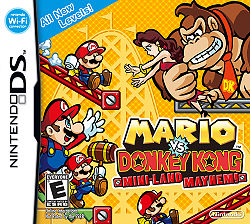 For alternate box art, see the game's gallery. | |||||||||||
| Developer | Nintendo Software Technology Corporation Nintendo SPD Group No.3 | ||||||||||
| Publisher | Nintendo | ||||||||||
| Platform(s) | Nintendo DS | ||||||||||
| Release date | |||||||||||
| Language(s) | English (United Kingdom) English (United States) French (France) French (Canada) German Spanish (Spain) Spanish (Latin America) Italian Japanese | ||||||||||
| Genre | Puzzle | ||||||||||
| Rating(s) |
| ||||||||||
| Mode(s) | Single-player | ||||||||||
| Format | Nintendo DS:
Game Card
| ||||||||||
| Input | Nintendo DS:
| ||||||||||
| Serial code(s) | |||||||||||
Mario vs. Donkey Kong: Mini-Land Mayhem! is an action puzzle game for the Nintendo DS. It is the fourth game in the Mario vs. Donkey Kong series and a follow-up to Mario vs. Donkey Kong: Minis March Again! Notably, it is also the final Super Mario game released for the console, being released in North America on November 14, 2010, Japan and Taiwan on December 2, 2010, Australia on February 3, 2011, and Europe on February 4, 2011. The base gameplay and objectives of this game are mostly the same as in the previous titles, being centered on bringing all the Mini toys safely to the goal in each level. However, the gameplay is now focused on tracing paths and bridges for the Minis to use, more so than simply toggling blocks and buttons to determine their path as in the previous games. Mini Pauline toys make their debut with this game, joining the cast of Minis as the highlight of Mario's new theme park despite appearing late in the game as playable characters. Alongside the main game, a level editor is also present in a mode called the Construction Zone, where players can design their own levels.
A significant feature of Mario vs. Donkey Kong: Mini-Land Mayhem! was its Wi-Fi compatibility, using the same system as in Mario vs. Donkey Kong 2: March of the Minis. Every two weeks, Nintendo held challenge contests where the player could submit a level that was subsequently judged by other players, with the top-rated level being announced as a winner candidate at the end of a contest. If played on a Nintendo DSi or Nintendo 3DS, the game supported WPA2 and WPA Wi-Fi networks but is region-locked when played on those consoles. However, the service was terminated on May 20, 2014, rendering the game no longer playable online.
Most future titles in the series, such as Mario and Donkey Kong: Minis on the Move, would also feature the construction-based gimmick from Mario vs. Donkey Kong: Mini-Land Mayhem! A follow-up, Mario vs. Donkey Kong: Tipping Stars, was released for the Nintendo 3DS and Wii U in March 2015.
Story[edit]
Mario is opening his new theme park with his honored guest Pauline, and as an opening gift he is giving Mini Pauline toys to the first 100 guests to arrive at the park. Donkey Kong desperately wants a Mini Pauline and charges through the line of Toads to get to the front, only to find out that he is the 101st guest to arrive, with Mario informing him they are all out of stock. Donkey Kong loses his temper and kidnaps the real Pauline in a fit of rage, leaving Mario and his force of Mini Marios to rescue her.
After venturing through many attractions, the Minis reach the Final Ferris Wheel and defeat Donkey Kong. Pauline is then freed and Mario runs to hug her. However, Donkey Kong jumps and kidnaps her again, which allows the player to play the Plus Mode. In the second ending, when Donkey Kong is about to kidnap Pauline a third time, Mario offers him a Mini Pauline. Donkey Kong happily accepts it and gets into the Ferris wheel along with Mario, Pauline, and some other Minis. Several Toads can be seen celebrating the end of the conflict between Mario and Donkey Kong.
Mario handing out Minis
Gameplay[edit]
Main Game[edit]
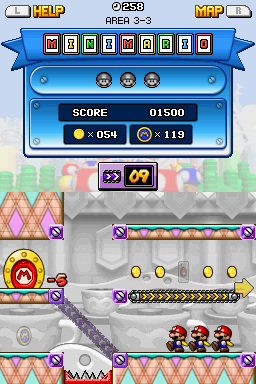
The game inherits the basic gameplay of its two closest predecessors, Mario vs. Donkey Kong 2: March of the Minis and Mario vs. Donkey Kong: Minis March Again!, in which the player has to complete levels by guiding a number of automated Mini toys to the exit door, under a time limit of 300 seconds (five minutes). The Minis move by themselves and rely completely on the player dragging and moving objects such as girders, springs, conveyor belts, pipes, and ladders to modify their path using the touchscreen. In most levels, Minis can be initiated by tapping on them individually, and their course can be set both before or after initiation. Minis are also set marching if other toys bump into them. If a Mini touches an enemy, falls onto spikes, touches any damaging obstacle, or falls from a height of ten or more blocks, it breaks and causes a Game Over, forcing the player to restart or exit the level.
Most levels end in a single exit door that all Minis share. Once the door is entered by a Mini, a timer is activated on it. If the door is not entered in time by another Mini, it will lock itself, leaving any other toys out and resulting in a Game Over. As such, the toys have to head for the exit in close succession. Other levels, designated as Multi-Door, contain multiple doors that are only used by Minis shown on them and which do not activate a timer upon being entered. In these levels, most Minis are trapped in capsules which can only be broken by a free Mini. Also, some exit doors are locked and require the Mini with a key to unlock it (in levels designated as Key).
Some areas contain enemies or Crumble Blocks that may prevent access to points of interest, such as doors or collectibles. To remove these obstacles, the Minis can use Hammers picked up along the way or shoot from a cannon. Many levels feature sloped ground of varying angles; if the angle of a slope is steep enough, it will cause Minis to slide down on it uncontrollably, which can also be done to destroy obstacles but may likewise hinder the Minis from accessing certain elevated platforms unless a workaround is found.
Levels are laid across eleven attractions of the Mini-Land, two of which are extra attractions whose levels are unlocked under certain conditions. An M-Token is found alongside a Mini Mario Card in each level. Collecting M-Tokens is necessary to unlock levels in Rainbow Summit, a bonus attraction, while Mini Mario Cards enable the player to play minigames in each attraction.
The player's performance in a level is measured with a score, which takes into account the items collected along the way and the time remaining to complete the level. A goal score is established for every level, which the player can pass to earn a gold trophy. With every ten trophies that are earned, the player unlocks a new level in Secret Storage, another bonus attraction besides Rainbow Summit.
The final score of a level, or "Total Score," is the sum of the following:
- a "Game Score," which is the score obtained by collecting coins, large coins, Mini Mario Cards, and M-Tokens; they are worth 100, 500, 1,000, and 2,000 points, respectively;
- a "Time Bonus,” 20 points are earned for each second left in the timer;
- a "Collection Bonus," which is a set number of 6,000 points awarded by grabbing all collectibles in a level.
Every attraction culminates with a battle against Donkey Kong, where the objective is slightly changed from other levels. Instead of an exit door, Minis have to be brought into certain devices or objects that inflict damage on Donkey Kong. Meanwhile, Donkey Kong tries to impede them by changing the environment, such as making certain Red Girder rivets unusable, or by sending direct attacks.
Additionally, the game features an optional Mini Guide that becomes available in a level after five Game Overs in a row. If the player chooses to play the guide, they can see an example of how to get the Mini Marios to the end of the stage. The music played during these guides is an arrangement of the series' invincibility theme.
While in a regular level, the top screen of the console shows information related to it, such as time remaining, Mini status, and current score. By pressing the ![]() button, the player can switch to a schematic map of the entire level. On said map, the player can see where the Minis and enemies are located. Pressing the button again switches back to the information screen.
button, the player can switch to a schematic map of the entire level. On said map, the player can see where the Minis and enemies are located. Pressing the button again switches back to the information screen.
Like in Mario vs. Donkey Kong 2: March of the Minis and Mario vs. Donkey Kong: Minis March Again!, if the player enters the Nintendo DS's Sleep Mode by closing their system at any point during the game, Mario says one of four lines. However, the lines Mario says in this game are different from previous games:
- "What are you doing?"
- "Hey! You! Come back here!"
- "Ow! My head!"
- "Oh, you mamma mia (Italian gibberish)"
Mario says different lines if the player exits Sleep Mode by opening their system:
- "Woo-hoo!"
- "Okey-dokey!"
- "Let's get going!"
- "Here we go!"
Minigame[edit]
There is an optional level in every attraction that consists of a minigame. It is unlocked after all nine Mini Mario Cards are collected in that attraction. With regard to gameplay, these minigames are similar to pachinko machines. The player must use objects such as Red Girders and conveyor belts to lead Minis from the top into toy boxes located at the bottom. The player scores points for each Mini that reaches its goal. There is also a time limit of 60 seconds (one minute); however, the remaining time can be increased by ten seconds by leading the Minis into clock items that occasionally spawn on the screen. The layout of each minigame varies from one attraction to another.
In odd-numbered minigames, there are star-stamped toy boxes called score boxes, which offer different point values that change regularly between them. They can multiply the number of points by 1, 2, 3, or 4, with 100 being the default amount of points. However, there are also distinct, black-colored Minus Boxes that feature a red cross sign. If entered, they decrease the score with up to two times their value. In even-numbered minigames, each Mini has to be guided into a specific box that depicts its face, obtaining 100 points. Dropping a Mini in the wrong box yields no points.
There are three goal scores established for every minigame. Passing one of them awards the player with an M-Token, making it possible to earn up to three M-Tokens in each minigame.
Help Mode[edit]
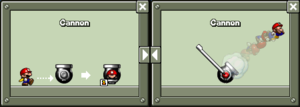
While in a level, the player can press the ![]() button on the console to enter Help Mode. During this mode, the game is paused and the player can tap any interactive object on-screen to learn how it functions with visual tips.
button on the console to enter Help Mode. During this mode, the game is paused and the player can tap any interactive object on-screen to learn how it functions with visual tips.
Construction Zone[edit]
Like previous entries in the Mario vs. Donkey Kong series, Mario vs. Donkey Kong: Mini-Land Mayhem! features a Construction Zone mode, where the player can build their own custom levels and share them with other players. Before the player can access the primary features of the Construction Zone, they must create a user name and complete Level Creation 101, a tutorial mode where the player must use the level editor to complete four nearly finished levels. After completing Level Creation 101, four other modes can be accessed from the Construction Zone menu:
- Create: Allows the player to create a level using the level editor, after choosing a Game-Rule and Template Type.
- Play & Edit: Allows the player to view and play their own levels, as well as levels downloaded from other players.
- Share: Allows the player to locally share their levels with other players. Prior to the discontinuation of Nintendo Wi-Fi Connection, players could also upload and download levels online.
- Challenge Mode: Players could create and play levels as part of level creation contests, which Nintendo hosted every two weeks.
Options[edit]
Separate from the Main Game and Construction Zone, on the title screen, there is also an Options menu. Although it mainly serves in adjusting various settings, it also features a collection of unlockables. In the Options menu, the player can perform the following actions:
- Access the Audio menu, where the volume of the music and sound effects can be adjusted. In addition, there is a Sound Test that is divided into 137 musical tunes and 235 different sound effects from the game. The Sound Test is initially locked, and only becomes available after defeating the final boss.
- Access the Gallery menu, where the player can rewatch the game's cinematic sequences, attraction intros, DK intros, and game credits, provided they were triggered beforehand during the main game.
- Change their user name.
- Toggle the Newsfeed feature to allow or prevent Nintendo from delivering information on the current running contest in the Construction Zone (see Challenge Mode).
- Erase all data from the game card.
Controls[edit]
– drag or tap objects; navigate menus
– navigate level
 - pause game
- pause game - enter Help Mode (in-level)
- enter Help Mode (in-level) - switch between map and info on the top screen (in-level)
- switch between map and info on the top screen (in-level)
Characters[edit]
Mario, one of the titular characters, only plays a role in the story cutscenes. In cutscenes that play between attractions, he is seen chasing Donkey Kong and Pauline in a locomotive, the Super Mini Mario Express, where he is accompanied by a few Minis. After dropping at a station, Mario demonstrates the elements of the new attraction with the Minis. Meanwhile, Pauline cries for help in Donkey Kong's arms. Aside from cutscenes, Donkey Kong also appears in boss levels, where he is fought. Pauline is always kept beside him, where she watches the actions of the Minis as they unravel. Toads appear as visitors of Mario's newly opened theme park, but they are only figurant characters.
Only the Minis are directly used in gameplay, the help of which Mario uses to rescue Pauline. Although they are miniature versions of various characters from the Super Mario franchise, Minis do not act differently from each other. Being automated clockwork toys, they simply walk from side to side and are likewise able to jump over blocks to continue their march. However, they turn around when encountering a wall of two or more blocks, a tight entrance, or a conveyor belt going in the opposite direction. They are destroyed on contact with obstacles such as Spikes, Shy Guys, Pokeys, and Thwomps, but can fight back with a pair of Hammers or by sliding down a steep slope.
Attractions[edit]
There are a total of 103 levels in the game, counting both main levels and extra levels, spread across eleven attractions. As in previous games of the series, they can be selected from a menu. Each one of these attractions, except for Rainbow Summit and Secret Storage, acquaint the player with a new gameplay mechanic that is the focus of that attraction. The levels in all main attractions are built in a certain respect: a new mechanic is always introduced in the first level (and, sometimes, the second level), multiple doors appear in the fourth level, an enemy or more appear in the fifth level (though they are not exclusive to it), a type of Donkey Kong's robot is present in the seventh level, a locked exit and a Mini Mario with a key are allocated to the eighth level, and the area closes with a boss battle.
Levels in the main game are unlocked one after the other in a classic manner, but levels in Rainbow Summit are unlocked with every ten M-Tokens collected in previous levels, while levels in Secret Storage require ten trophies each. Secret Storage is to be noted for puzzles that are more complex to solve than those of earlier levels, serving as an ultimate challenge for the player.
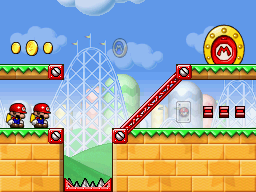
|
Attraction 1 Coaster Hills An attraction whose levels are simple puzzles meant to initiate the player in the use of Red Girders, Pipes, and Ladders. A Shy Guy and a Circus Kong are present in this attraction as well. Areas 1-1 • 1-2 • 1-3 • 1-4 • 1-5 • 1-6 • 1-7 • 1-8 • 1-DK |
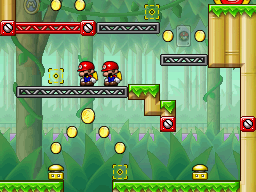
|
Attraction 2 Jumpy Jungle An attraction where Vertical and Horizontal Springs are added to the gameplay. Areas 2-1 • 2-2 • 2-3 • 2-4 • 2-5 • 2-6 • 2-7 • 2-8 • 2-DK |
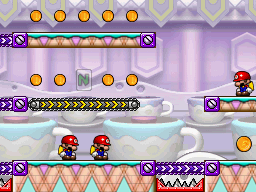
|
Attraction 3 Teatime Twirl An attraction that highlights conveyors. It contains both Gray Conveyors and Purple Conveyors. Areas 3-1 • 3-2 • 3-3 • 3-4 • 3-5 • 3-6 • 3-7 • 3-8 • 3-DK |
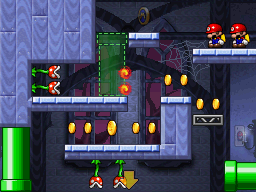
|
Attraction 4 Warped Mansion An attraction that introduces movable Green Pipes, as well as Piranha Plants and Piranhas with Fire as enemies. Areas 4-1 • 4-2 • 4-3 • 4-4 • 4-5 • 4-6 • 4-7 • 4-8 • 4-DK |
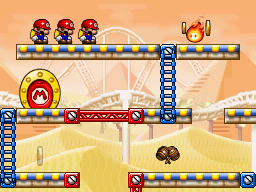
|
Attraction 5 Sandstorm Steps An attraction where Blue Ladders are introduced to the gameplay, alongside Fireball enemies, as an homage to the original Donkey Kong game. The Capture Kong also makes its first appearance in the game. Areas 5-1 • 5-2 • 5-3 • 5-4 • 5-5 • 5-6 • 5-7 • 5-8 • 5-DK |
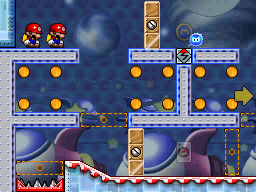
|
Attraction 6 Cosmic Adventure An attraction where the gameplay revolves around the use of the newly-introduced Magnet Rods and Blockers. Thwomps are encountered in this attraction for the first time. Areas 6-1 • 6-2 • 6-3 • 6-4 • 6-5 • 6-6 • 6-7 • 6-8 • 6-DK |
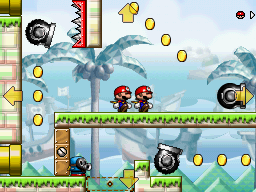
|
Attraction 7 Cannon Cove An attraction whose primary gimmick are Cannons that shoot the Minis in various directions. A few Snifits also reside in this attraction. Areas 7-1 • 7-2 • 7-3 • 7-4 • 7-5 • 7-6 • 7-7 • 7-8 • 7-DK |
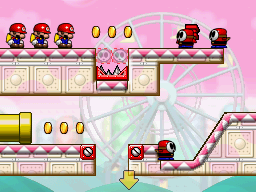
|
Attraction 8 Super Skywheel An attraction that introduces enemy blocks that can be filled in by certain enemies, such as Shy Guys and Pokeys, the latter being seen within this attraction for the first time in the game. The attraction also recapitulates the mechanics used in previous levels. Areas 8-1 • 8-2 • 8-3 • 8-4 • 8-5 • 8-6 • 8-7 • 8-8 • 8-DK |
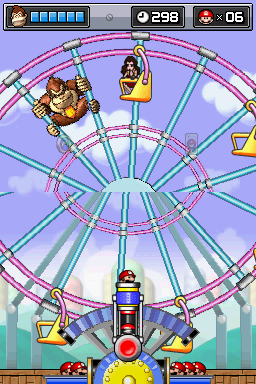
|
Final Battle Final Ferris Wheel An attraction that hosts the final boss battle with Donkey Kong. It is also the last main attraction of the game. Area Donkey Kong Final Battle |
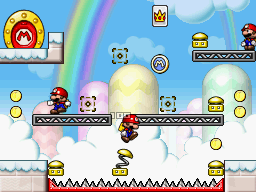
|
Special Levels Rainbow Summit An extra attraction with a series of challenges referred to as "Special Levels," during which the player is only allowed to change the environment after activating all the Minis at the same time by tapping the "Start" button. The attraction does not introduce new elements, but reuses all of the previous ones. It is the largest attraction in the game, spreading on two level select menus. Areas S-1 • S-2 • S-3 • S-4 • S-5 • S-6 • S-7 • S-8 • S-9 • S-10 S-11 • S-12 • S-13 • S-14 • S-15 • S-16 • S-17 • S-18 • S-19 • S-20 |
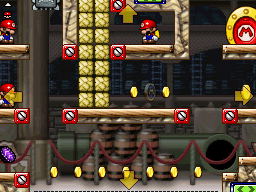
|
Expert Levels Secret Storage Another extra attraction that resumes the main gameplay. Its levels are also referred to as the "Expert Levels," as it features previous game mechanics in puzzles that are considerably more difficult to solve. Areas X-1 • X-2 • X-3 • X-4 • X-5 • X-6 • X-7 • X-8 • X-9 • X-10 |
Plus Mode[edit]
After defeating him in Final Ferris Wheel, Donkey Kong manages to run off with Pauline once more, prompting the player to traverse all levels again in a new mode called Plus Mode. During Plus Mode, Minis must enter the exit door in a certain order, which is indicated at the beginning of each stage and also shown on the top screen of the console. While this complicates gameplay, there are otherwise no changes in level layout, although the background in each attraction gains slightly different aesthetics. In Plus Mode, all M-Tokens and Mini Mario Cards have to be collected again. The player can switch to Plus Mode anytime by tapping on the "Plus" button on the level select menu. In Plus Mode, the name of each attraction is written with a "+" at the end, such as:
- Coaster Hills+
- Jumpy Jungle+
- Teatime Twirl+
- Warped Mansion+
- Sandstorm Steps+
- Cosmic Adventure+
- Cannon Cove+
- Super Skywheel+
- Final Ferris Wheel+
- Rainbow Summit+
- Secret Storage+
Pauline is rescued and the game is beaten after defeating Donkey Kong in Final Ferris Wheel+.
Items and objects[edit]
The game presents a wide variety of objects that fulfill certain purposes. The most represented objects in the game are the resource items, which can be taken, stored, and repositioned in special designated areas. There are also numerous objects that are fixed, but are similarly used to the player's advantage. Most collectable items have a direct role in completing the game, but a few others only have a function within levels.
| Object | About |
|---|---|
Blockers |
Blockers are metal blocks that act as either walls or floors that can be placed using the stylus. |
Blue Ladders |
Blue Ladders are ladders that can be drawn using the stylus and climbed by the Minis. |
Cannons |
Cannons are objects used to shoot the Minis to a different part of a level. |
Coins |
Coins can be collected throughout the levels for points. Large coins also appear, which are worth 5 normal coins. |
Conveyor belts |
Conveyor belts move Minis and enemies in a certain direction. |
Conveyor switches |
Conveyor switches can reverse the direction of all conveyor belts in a level if the player taps them with the stylus. |
Conveyor Pickups |
Conveyor Pickups give the player more conveyor belts to place. Bigger versions appear which give the player five Conveyor Pickups. |
Crumble Blocks |
Crumble Blocks are blocks that break and fall apart under a Mini's weight. They can also be destroyed by shooting a Mini from a Cannon or by having a Thwomp fall on them. |
Exit Doors |
Exit Doors are the goals of each level; the player must lead the Minis into them. Mini-specific Exit Doors also appear, as well as locked Exit Doors. |
Girders |
Girders are platforms that are used mainly for decoration in most levels. They are semi-solid and are not affected by anything. |
Girder Pickups |
Girder Pickups give the player more Red Girders to draw. Bigger versions appear which give the player 5 Girder Pickups. |
Hammers |
Hammers can be used to stun enemies such as Circus Kongs or break Rock Blocks. |
Horizontal Springs |
Horizontal Springs bounce the Minis in a wide arc. |
Ladders |
Ladders are objects that the Minis are able to climb in order to reach higher levels. |
Ladder Pickups |
Ladder Pickups give the player more Blue Ladder to place. Bigger versions appear which give the player 5 Ladder Pickups. |
M-Tokens |
M-Tokens are collectibles found in each level that give the player 2000 points. |
Magnet Blocks |
Magnet Blocks allow Minis to walk sideways and upside down on them. |
Magnet Rods |
Magnet Rods are objects that flip the Minis in another path when they are walking on a magnetic surface. |
Mini Mario Cards |
Mini Mario Cards are found in each level. They spell out "MINIMARIO" and unlock a minigame when all of them are collected in a world. |
Movable Pipes |
Movable Pipes are green Warp Pipes that can be moved and appear as dotted outlines. |
Pipes |
Pipes are blue Warp Pipes that lead Minis to another area of a level. If a Mini enters one end of a pipe, it moves to the other end. |
Purple Conveyors |
Purple Conveyors are conveyor belts that can be drawn using the stylus. |
Red Girders |
Red Girders are girders that can be drawn using the stylus. |
Spikes |
Spikes are obstacles that destroy the Minis if they are touched, causing the player to have to restart the level. |
Split Pipes |
Split Pipes are Warp Pipes that appear in pairs. If a Mini enters a Split Pipe, it moves to the other Split Pipe of the same color. Split Pipes can be yellow, cyan, orange, or red. |
Vertical Springs |
Vertical Springs bounce the Minis straight into the air. |
Enemies[edit]
Enemies encountered over the course of the game, not counting boss-exclusive obstacles such as barrels, are represented by two types. The first type are malevolent enemies that destroy the Minis by touching or attacking them; however, most of them can be defeated with Hammers, a slope slide or a Cannon blast. The second type consists of Donkey Kong's robots that use the Minis in characteristic ways. Their actions may be helpful or dangerous, although they never inflict damage on the Minis. These enemies are invulnerable, but can be stunned by attacking them by the same means described earlier, which is necessary in certain situations.
| Enemy | About | First appearance | Last appearance |
|---|---|---|---|
Barrel |
Donkey Kong uses barrels in a few of his boss fights by pounding the ground and causing them to fall. | Area 1-DK | Area 8-DK |
Capture Kong |
Capture Kongs capture Minis inside the barrel on their back and can end a level in failure if all Minis are captured. They can be stunned with a hammer. | Area 5-7 | Area 8-7 |
Circus Kong |
Circus Kongs throw Minis up into the air and can be stunned using a hammer. | Area 1-7 | Area X-3 |
Piranha with Fire |
These Piranha Plants spit fireballs, which can destroy the Minis. | Area 4-5 | Area X-9 |
Fireball |
Fireballs move along the ground and will charge at a Mini if they are holding a hammer, allowing it to be defeated. | Area 5-2 | Area S-10 |
Pokey |
Pokeys move along the ground and will turn transparent yellow blocks into solid blocks called Pokey Blocks. They can be defeated by shooting a Mini at one using a cannon. | Area 8-3 | Area S-16 |
| Polterguy | Polterguys that are summoned from a Shy Guy portrait. | Area 4-DK | |
Shy Guy |
Shy Guys can be stood on by the Minis and will turn some transparent blocks into solid blocks called Shy Guy Blocks. | Area 1-4 | Area X-5 |
Snifit |
Snifits attack by moving quickly along the ground and shooting five successive bullets at the Minis. | Area 7-6 | Area X-9 |
Magnet Sparky |
Magnet Sparkies move along magnetic objects and their path can be changed by flipping a Magnet Rod. | Area 6-2 | Area 6-DK |
Thwomp |
Thwomps attempt to destroy the Minis by falling and crushing them. They can destroy objects such as Crumble Blocks. | Area 6-3 | Area X-8 |
 Donkey Kong |
Donkey Kong appears as the boss of the last level in every world except for Rainbow Summit and Secret Storage. His attacks range from dropping barrels to hitting a switch which enables or disables an object. | Area 1-DK | Donkey Kong Final Battle |
Reception[edit]
Critical reception of Mario vs. Donkey Kong: Mini-Land Mayhem! was positive, and the game was repeatedly stated to offer an entertaining experience delivered with an appealing presentation. It currently has a score of 79 based on 51 reviews on Metacritic, and had an 80.08% score on GameRankings.
Daemon Hatfield of IGN "[could not] stress enough that [the game] is pure joy to play", stating that the variety of collectables brings a significant contribution to the game's replay value. He also described the game as "absolutely adorable," and the puzzles as "satisfying to work out" despite not being particularly difficult. However, he added that a speed-up option would have been beneficial for gameplay, as he found the movement of the Minis to be rather sluggish, especially in earlier levels.[2]
Philip J Reed of Nintendo Life debuted his review by describing the game as "stellar" and "an excellent place to start" for those unfamiliar with the Mario vs. Donkey Kong series. He noted that part of the fun stems from the game's spirit of discovery, which properly defines the levels from a design standpoint. He made mention of the game's level editor, describing it as simple to grasp, and further noted the ability to share and download custom levels, which he praised for greatly extending the game's replayability. The graphics were said to compose a "sweet, sunny atmosphere," and the cutscenes as well as soundtrack were also complimented.[3]
Nathan Meunier of GameSpot referred to the game's story as "bare-bones" and "esentially the same plot" as in past games, but favored the gameplay of Mario vs. Donkey Kong: Mini-Land Mayhem! over other titles in the series. In this regard, he appreciated the game's concept of building the environment for the Minis, instead of simply toggling blocks and other features to form their way as in past games.[4]
| Reviews | |||
|---|---|---|---|
| Reviewer, Publication | Score | Comment | |
| Daemon Hatfield, IGN | 9.0/10 | "The Mario vs. Donkey Kong series never fails to deliver enjoyable puzzle experiences. Mini-Land Mayhem essentially offers "more of the same," but when that same is so charming you're not going to hear too many complaints. The ability to create your own levels, share them online, and compete in Nintendo sanctioned design contests gives Mini-Land Mayhem major replay value. This is most likely the last Mario vs. Donkey Kong game we'll get for the DS, so don't miss it." | |
| Philip J Reed, Nintendo Life | 9/10 | "Lots of gameplay, great graphics, a wonderful soundtrack and flawless touchscreen controls make Mario vs. Donkey Kong: Mini-Land Mayhem! a worthy addition to an often-overlooked franchise. While the game's real-time puzzle element may not appeal to everybody, those who do take the time to become familiar with it will appreciate its unique and challenging approach. Mini-Land Mayhem! proves that – four games in – the Mario vs. Donkey Kong series hasn't lost one ounce of charm." | |
| Nathan Meunier, GameSpot | 8/10 | "If you enjoyed the previous entries enough to crave more, or if you've been thinking about checking out the series for the first time, don't hesitate to give Mini-Land Mayhem a go." | |
| Aggregators | |||
| Compiler | Platform / Score | ||
| Metacritic | 79 | ||
| GameRankings | 80.08% | ||
Gallery[edit]
- For this subject's image gallery, see Gallery:Mario vs. Donkey Kong: Mini-Land Mayhem!
Donkey Kong, Mario, Pauline, and Mini Marios
Media[edit]
- For a complete list of media for this subject, see List of Mario vs. Donkey Kong: Mini-Land Mayhem! media.
Pre-release and unused content[edit]
Within the game's Shy Guy assets is a leftover sprite of the spear from Mario vs. Donkey Kong: Minis March Again!.[5] This may indicate that both types of Shy Guys were intended to appear.
Staff[edit]
- Main article: List of Mario vs. Donkey Kong: Mini-Land Mayhem! staff
The game was developed under the direction of Yuki Shimura by the Nintendo Software Technology Corporation, which is also accounted for previous Mario vs. Donkey Kong projects. Development of the game was assisted by the Nintendo Software Planning & Development Group No. 3. Notably, the game's lead level designer, Stephen Mortimer, would be promoted to direct subsequent titles in the series. For Mario vs. Donkey Kong: Mini-Land Mayhem!, Mortimer designed over 50 stages, while the rest were created by two other designers under his supervision. In addition, he assisted the development of level editor features, and helped design various objects from the game as well.[6] The audio direction was provided by Lawrence Schwedler, whose work for Mario vs. Donkey Kong: Mini-Land Mayhem! would be one of his last contributions at Nintendo before leaving the company in 2012.[7]
Glitches[edit]
This section needs additional citations for verification. Unsourced material may be challenged and removed. Specifics: Citations for every glitch.
Please help improve this section by adding citations from reliable sources.
DK stage sound glitch[edit]
In any DK stage with rivets, once Donkey Kong is hit and recovers from it, the player should hold one rivet down quickly. Donkey Kong's yell and Pauline's call will be heard, even though their sprites are not in motion. When the rivet is let go, Donkey and Pauline's animations will resume without their voice clips.
Intangible girders[edit]
When a Mini Mario is in-between a pair of red rivets, the player needs to quickly create a girder between the two. When performed, the Mini will go through the girder as if it was not there. (This can be performed either horizontally or vertically.)
Offscreen death glitches[edit]
When building a level in the Construction Zone, if the player creates a slope, then places a stationary cannon at the bottom (this must be done in the level borders and maximum slope), when the Minis are fired, they will pass through the wall and they will fall off the screen.
A similar glitch occurs in Area 5-DK. Here, the player should connect a girder from the top left to the bottom right rivet by the card. Next, they must have a Fireball next to the top left rivet. When done correctly, the Fireball will go down the red girder, fall through the floor at the end, and death sound clip play a second later.
Spring glitch[edit]
In Construction Zone, the player needs to create a level. They need to put a tile on the ground so the Mini Mario can jump and put a spring one-and-a-half blocks above the tile. When starting the Minis, one will try to jump, but will pass through the tile.
References to other games[edit]
- Donkey Kong: The "Opening" theme of this game is arranged into the main theme. The introduction sequence when Donkey Kong climbs some ladders with Pauline is referenced at the end of each non-final boss battle through both music and action, as Donkey Kong similarly runs off with Pauline to another attraction. Objects such as Red Girders and Blue Ladders are reminiscent of stage elements from Donkey Kong, as are the Hammers which play their original jingle when in use. In fact, Area 5-2, a level that contains all these elements and Fireball enemies, appears to be a direct homage to levels like 25m and 75m from Donkey Kong.
- Super Mario Bros.: The "Ground Theme" from this game is arranged into the main theme. The "Underground Theme" is arranged for the soundtrack of Secret Storage.
- Super Mario Bros. 2: The "Ground Theme", the lost life theme, and the boss victory theme of this game are arranged for the soundtrack of Coaster Hills. The boss theme is likewise arranged for the battle with Donkey Kong in Coaster Hills.
- Donkey Kong Country: "DK Island Swing" is arranged for the soundtrack of Jumpy Jungle.
- Super Mario 64: "Inside the Castle Walls", the theme of Peach's Castle, is arranged for the soundtrack of Teatime Twirl.
- New Super Mario Bros.: Mario's walk cycle from this game is reused for the final cutscene, when Pauline is rescued.
Names in other languages[edit]
| Language | Name | Meaning | Notes |
|---|---|---|---|
| Japanese | マリオ Mario buiesu Donkī Kongu Totsugeki! Mini Rando |
Mario vs. Donkey Kong: Attack! Mini-Land | |
| Chinese (traditional) | 瑪利歐vs.大金剛 突擊!迷你樂園[8] Mǎlìōu vs. Dàjīn'gāng Tújí! Mínǐ Lèyuán |
Mario vs. Donkey Kong: Assault! Mini Wonderland | |
| French (NOE) | Mario vs. Donkey Kong: Pagaille à Mini-Land ![?] | Mario vs. Donkey Kong: Mess in Mini-Land! | |
| German | Mario vs. Donkey Kong: Aufruhr im Miniland![?] | Mario vs. Donkey Kong: Turmoil in Mini-Land! | |
| Italian | Mario vs. Donkey Kong: Parapiglia a Minilandia[?] | Mario vs. Donkey Kong: Turmoil in Mini-Land | |
| Spanish (NOA) | Mario vs. Donkey Kong: Mini-Land Mayhem![?] | - | |
| Spanish (NOE) | Mario vs. Donkey Kong: ¡Megalío en Minilandia![?] | Mario vs. Donkey Kong: Megamess in Mini-Land! |
References[edit]
- ^ https://www.nintendo.com/en-za/Games/Nintendo-DS/Mario-vs-Donkey-Kong-Mini-Land-Mayhem--271573.html
- ^ Hatfield, Daemon (November 12, 2010). Mario vs. Donkey Kong: Mini-land Mayhem Review. IGN. Retrieved June 22, 2024.
- ^ Reed, Philip J (December 19, 2010). Review: Mario vs. Donkey Kong: Mini-Land Mayhem! (DS). Nintendo Life. Retrieved June 22, 2024.
- ^ Meunier, Nathan (November 12, 2010). Mario vs. Donkey Kong: Mini-Land Mayhem Review. GameSpot. Retrieved June 22, 2024.
- ^ lexicon86. DS / DSi - Mario vs. Donkey Kong: Mini-Land Mayhem! - Shy Guy. The Spriters Resource. Retrieved March 14, 2024.
- ^ Stephen Mortimer. LinkedIn (English). Retrieved June 22, 2024.[dead link]
- ^ Lawrence Schwedler. LinkedIn (English). Retrieved June 22, 2024.
- ^ Nintendo DS 遊戯軟體. Nintendo of Taiwan (Traditional Chinese). Archived March 11, 2019, 18:12:55 UTC from the original via Wayback Machine. Retrieved June 22, 2024.
External links[edit]
- Official North American website[dead link]
- Official North American game page[dead link]
- Official Japanese website
- Official Australian website[dead link]
- Official European website
- PDF instruction booklet on Nintendo's website
